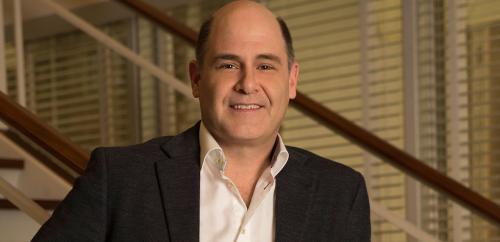As the show’s creator directs the season finale this week, we ask how he’s going to cope when it’s all over.
Architect William F. Lamb broke ground on the corner of New York’s 5th Avenue and 34th Street in 1929; one year and 45 days later he crowned the 1,453 feet tall tower with its spire. The Empire State Building remained the world’s tallest building until the 1970s. The Sistine Chapel ceiling took Michelangelo 4 years of painting on his back. By contrast, the creator of Mad Men wrote the pilot show 14 years ago and is only just directing the final episode of the 1960s saga this week.
“I’m not good at math, but I think it’s close to a third of my life,” said Matthew Weiner at this year’s Cable Show in Los Angeles.
Weiner had previously worked on The Sopranos, which is why he thinks AMC gave him a shot to write and direct the period drama set in an ad agency on New York’s Madison Avenue. If it seems almost unimaginable to you to spend nearly a decade and a half of your life devoted to one project, you’re not alone.
“I got to grow up as Don has grown up,” said Weiner.
Much like The Sopranos, Mad Men has enjoyed critical acclaim and a frenzy of media attention. Cast your mind back to 2007, when the show first hit screens and the year was 1960 – little did we viewers know how successful and long lived the show would be. Who knew it would stay with us long enough to travel through the entire decade, dealing with the issues of sexism, race and infamous assassinations that defined 1960s America. Some of us watch the show for these social commentaries, others try to figure out what the heck is wrong with Don or maybe you just enjoy watching the aesthetics of the set and costumes change with the times from season to season.
So how does one deal with being at the helm of a TV cult ship coming into port?
“There’re waves of feelings and I’m not even at the real feeling of what it’s going to be like, which I know will be loss,” said Weiner, “The thing I’m focusing on is savoring what’s left and the idea of completing something.”
The closing of a show on the creator’s own terms (and not that of viewer ratings) creates a bittersweet feeling, said Weiner, but it isn’t something that’s been all that common in the past.
“Series television is not something that works itself to completion all the time and [my] job is to keep the story going every week. We always have a completion to the season, but the idea that we’re getting to the end of this, I feel good about that. Emotionally, it’s very confusing. I’m looking forward to seeing my family again!”
